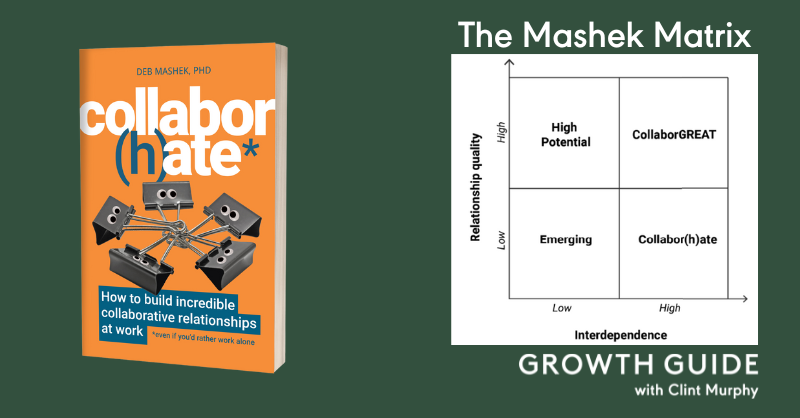Thread
Collaboration is important for YOU in School, Work and Life.
But, most of us suck at collaboration.
Here's how you can change that:
But, most of us suck at collaboration.
Here's how you can change that:
• Collaboration
Collaboration is the process of working together:
• Intentionally
• With known people
• In service to a shared goal
When collaboration works, everyone benefits:
• You
• Your Team
• The Projects
• The Organization
Collaboration is the process of working together:
• Intentionally
• With known people
• In service to a shared goal
When collaboration works, everyone benefits:
• You
• Your Team
• The Projects
• The Organization
• Collabor(h)ate
49% of students have negative or very negative feelings about Class Projects.
Here are some of the common reasons you hate to collaborate:
• Herding cats
• Dropped balls
• Disengagement
• Unever workload
• I'll just do it myself
• My way or the highway
49% of students have negative or very negative feelings about Class Projects.
Here are some of the common reasons you hate to collaborate:
• Herding cats
• Dropped balls
• Disengagement
• Unever workload
• I'll just do it myself
• My way or the highway
• The Mashek Matrix
To create healthy sustainable collaborations, focus on:
• Interdependence
• Relationship quality
Interdependence relates to how aligned your outcomes are.
Relationship quality is your subjective sense of the relationship with your collaborators.
To create healthy sustainable collaborations, focus on:
• Interdependence
• Relationship quality
Interdependence relates to how aligned your outcomes are.
Relationship quality is your subjective sense of the relationship with your collaborators.
• Relationship Questions
Ask yourself:
• Are they trustworthy
• Do you like this relationship
• Do you enjoy being in relationship
• Is there a We instead of a Me or You
• Subjectively, how do you feel about them
If you answer Yes, Great.
If Not, then you've work to do.
Ask yourself:
• Are they trustworthy
• Do you like this relationship
• Do you enjoy being in relationship
• Is there a We instead of a Me or You
• Subjectively, how do you feel about them
If you answer Yes, Great.
If Not, then you've work to do.
• Improve Relationship
To improve your relationship,
• Be responsive
• Share your story
• Bring the donuts
• Behave accordingly
• Set clear expectations
• Embrace accountability
• Seek novelty and challenge
• Avoid telling yourself stories
To improve your relationship,
• Be responsive
• Share your story
• Bring the donuts
• Behave accordingly
• Set clear expectations
• Embrace accountability
• Seek novelty and challenge
• Avoid telling yourself stories
• Interdependence Questions
Ask yourself:
• How much time do you spend with them
• In what domains can they influence you
• How do you structure the work
• How do you measure it
• How do you reward it
It’s about the Doing and how you move to Getting the Work Done.
Ask yourself:
• How much time do you spend with them
• In what domains can they influence you
• How do you structure the work
• How do you measure it
• How do you reward it
It’s about the Doing and how you move to Getting the Work Done.
• Interdependence Ideas
Outcomes = Rewards - Costs
We must play fair in collaboration.
To do that, ensure the Ratio of Contributions to Outcomes is equal across collaborators.
Outcomes don't need to be equal.
Outcomes / Contributions do.
This is collaborator equity.
Outcomes = Rewards - Costs
We must play fair in collaboration.
To do that, ensure the Ratio of Contributions to Outcomes is equal across collaborators.
Outcomes don't need to be equal.
Outcomes / Contributions do.
This is collaborator equity.
• Interdependence Levers
Three key patterns determine the strength of our interdependence:
Frequency - how much time you spend together
Diversity - The range of activities you engage in
Strength - The degree of influence you each have on each other's plans, goals & behaviors
Three key patterns determine the strength of our interdependence:
Frequency - how much time you spend together
Diversity - The range of activities you engage in
Strength - The degree of influence you each have on each other's plans, goals & behaviors
Improve Frequency Dial:
• Shared headspace
• Formal & informal time
• Expectations response time
Improve Strength Dial:
• Resource access
• Workflow structure
• How Goals are specified
• How Goal progress is tracked
For the Diversity Dial, Do More or Less Together.
• Shared headspace
• Formal & informal time
• Expectations response time
Improve Strength Dial:
• Resource access
• Workflow structure
• How Goals are specified
• How Goal progress is tracked
For the Diversity Dial, Do More or Less Together.
This thread was based on my conversation with @DebMashek on the Growth Guide Podcast.
You can find Deb here: www.debmashek.com/
You can here our conversation here:
thegrowth.guide/podcast/
I hope you can use this to go from Collabor(h)ate to Collaborate !
You can find Deb here: www.debmashek.com/
You can here our conversation here:
thegrowth.guide/podcast/
I hope you can use this to go from Collabor(h)ate to Collaborate !
@DebMashek Thanks for joining us to this point.
Now, my friends, please:
1. Follow @IAmClintMurphy
2. Retweet the 1st Tweet
Now, my friends, please:
1. Follow @IAmClintMurphy
2. Retweet the 1st Tweet
@DebMashek That's a wrap.
It doesn't have to be.
Signup for the Growth Guide Newsletter and join 5,050 other readers.
You'll receive 5 Free Guides:
• Financial Rules
• Personal Finance
• Time Management
• Millionaire Blueprint
• Ultimate Twitter Growth
thegrowthguide.beehiiv.com/subscribe
It doesn't have to be.
Signup for the Growth Guide Newsletter and join 5,050 other readers.
You'll receive 5 Free Guides:
• Financial Rules
• Personal Finance
• Time Management
• Millionaire Blueprint
• Ultimate Twitter Growth
thegrowthguide.beehiiv.com/subscribe
